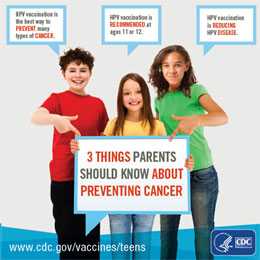Protect Your Children from Cervical and other HPV Cancers
 HPV vaccination can protect your children from several types of cancers, including cervical cancer. Get HPV vaccine for your sons and daughters at ages 11-12 to protect them from cancers caused by HPV infections.
HPV vaccination can protect your children from several types of cancers, including cervical cancer. Get HPV vaccine for your sons and daughters at ages 11-12 to protect them from cancers caused by HPV infections.
Every year in the United States, 31,000 women and men are diagnosed with a cancer caused by HPV infection. Most of these cancers could be prevented by HPV vaccination.
HPV vaccination prevents more than just cervical cancer. Vaccination can prevent uncomfortable testing and treatment even for cervical precancers. Each year in the U.S. more than 300,000 women endure invasive testing and treatment for lesions (changes in the cells) on the cervix that can develop into cancers. Testing and treatment for these “precancers” can have lasting effects.
However, cervical cancer only accounts for 1 in 3 cancers caused by HPV infection. While there is screening for cervical cancer, there is no routine screening for the other 20,000 cancers caused by HPV infections each year in the United States. Often these cancers—such as cancers of the back of the throat (oropharynx) and cancers of the anus/rectum—aren’t detected until later stages when they are difficult to treat.
When should my child get this shot?
All kids should get two shots of HPV vaccine at least 6 months apart at ages 11 or 12, finishing the two-shot series before their 13th birthday. Teens and young adults through age 26 who have not received the HPV shots should ask their doctor or nurse about getting them now—it’s not too late!
Teens and young adults who did not start the HPV vaccine series before they turned 15 will need three shots over six months for the best protection. Adolescent and young adults with a weakened immune system will also need three shots. Make an appointment today to get your child vaccinated.
If it has been a long time since your child got the first or second dose of HPV vaccine, you don’t have to start over—just get the remaining shot(s) as soon as possible.

Check out this infographic to learning more about preventing HPV cancers.
Is this shot safe?
HPV vaccines have been studied very closely and have an excellent safety record. Nearly 80 million doses of HPV vaccines have been distributed for use in the United States, and no serious safety concerns have been linked to HPV vaccination.
Like all medical products, vaccines can cause side effects. The most common side effects of HPV vaccines are mild and go away on their own, like pain and redness in the arm where the shot was given. Occasionally, patients might faint after receiving an injectable vaccine, or any shot. Preteens and teens should sit or lie down when they get a shot and stay like that for about 15 minutes after the shot. This can help prevent fainting and any injury that could happen while fainting.
The cancer prevention benefits of HPV vaccination far outweigh the risk of these side effects.
More Information
- Page last reviewed: January 17, 2017
- Page last updated: January 17, 2017
- Content source:
- National Center for Immunizations and Respiratory Diseases
- Page maintained by: Office of the Associate Director for Communication, Digital Media Branch, Division of Public Affairs




 ShareCompartir
ShareCompartir